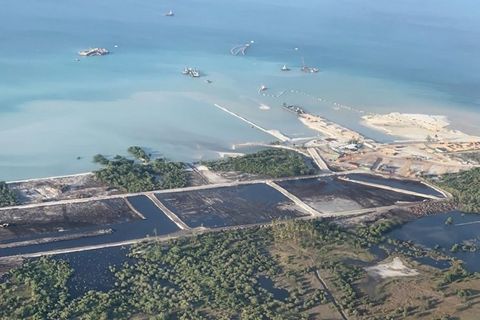Communication - Presse
TotalEnergies to restart Mozambique LNG project in 2024, first gas in 2028 – Rystad Energy

An analyst from consultancy Rystad Energy who follows Mozambique on Monday told Lusa that TotalEnergies will only resume its Mozambique LNG project in early 2024, delaying the start of gas production to 2028.
“Things could be complicated, as contracts may need to be renegotiated and new agreements may include the impact of inflation as well, which could lead to delaying the lifting of ‘force majeure’ to next year; so we estimate the project only starting in 2028,” Pranav Joshi said.
In an interview with Lusa regarding the return of the French oil major to Cabo Delgado, the Rystad Energy analyst said that TotalEnergies would also face increased costs on returning to the Mozambican province, not only due to the need to renegotiated contracts, but also due to the significant rise in inflation, not only in Mozambique, but also globally.
In 2021, due to insecurity in the region, TotalEnergies invoked ‘force majeure’ to suspend operations and made the return to work dependent not only on guaranteeing working conditions, but also on the conclusions of an independent report on social conditions and safety of local populations.
“TotalEnergies appears to be working behind the scenes to ensure a smooth lifting of ‘force majeure’, and they were aiming for the end of the year, having recently published a report signed by human rights expert Jean-Christophe Rufin, which made many recommendations, including the establishment of a multi-year socio-economic budget of US$200 million,” the analyst added.
Speaking to Lusa following news on the Zitamar website that pointed to a 25% increase in the project’s costs, the leader of the energy department at Rystad Energy stressed that this rise in prices is applicable not only in Mozambique but in the rest of the continent as well.
“Globally, liquefied natural gas costs have increased by 25%, but, based on the scope and execution model, the figure varies from project to project, typically between 15 to 30%,” Audun Martinsen explained.
“So, if TotalEnergues has not changed the concept of the project, they will be exposed to the same level of rising inflation as the others,” he concluded.
Mozambique has three development projects approved to exploit the natural gas reserves in the Rovuma basin off the coast of Cabo Delgado, ranked among the largest in the world.
The larger two of the foresee channelling the gas from the bottom of the sea to land prior to cooling it in a plant and exporting it by sea in a liquid state.
One is led by TotalEnergies (Area 1 consortium), and work was advancing until they were suspended indefinitely following an armed attack on Palma in March 2021, when the French energy company declared that it would only resume work when the area was safe.
The other is the still unannounced investment led by ExxonMobil and Eni (Area 4 consortium).
A third completed and smaller project also belongs to the Area 4 consortium and consists of a floating platform for capturing and processing gas for export directly by sea, which started operation in November, 2022.
The floating platform is expected to produce 3.4 mtpa (million tons per year) of liquefied natural gas. Area 1 aims for 13.12 mtpa and the land plan for Area 4 forecasts 15 mtpa.
The province of Cabo Delgado has been terrorised since 2017 by armed rebels, with some attacks claimed by the extremist group Islamic State.
The conflict has already displaced one million people, according to the United Nations High Commissioner for Refugees (UNHCR), and around 4,000 deaths, according to the ACLED conflict registration project.
An offensive by government troops with the support of Rwanda, which was later joined by the Southern African Development Community (SADC), made it possible to increase security, recovering several areas where there was a presence of rebels, namely the town of Mocimboa da Praia, which was occupied since August 2020.

